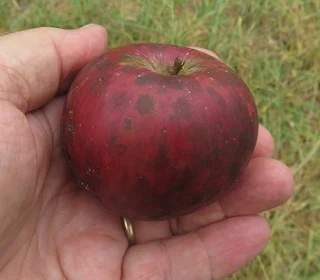Mosquitoes
Mosquitoes are still ferocious. My little patch of heaven had about 9" of rain in July which is about 3 times normal. I friend who lives a bit south of me had 11" in July
I went into the small tree nursery that I mess around in. I budded four rootstock to Harrow Sweet pear. I was just about carried off by the mosquitoes.
By the way, a big shout-out to the reader who suggested rechargable "camping" mosquito zappers. Mrs ERJ is thrilled. Zeus (our dog) is not. He sniffed one of the units and "ZAPPP!!!"
Bob Purvis's notes on Harrow Sweet:
Harrow Sweet (Harrow 609): Medium sized tree, moderately precocious, somewhat spreading growth habit, hardy in SW Minnesota to at least -34F, resistant to fire blight, very productive. Fruit ripens 3-1/2 weeks after Bartlett, yellow with red blush, sweet and juicy with excellent taste, keeps about 3 months in cold storage.
I decided to use Harrow Sweet as a "frame builder" on my pear trees. The truck and main scaffold limbs tend to be the most vulnerable to damage from winter-time and cold. Using a variety that is exceptionally cold-hardy and resistant to fire-blight as the "frame builder" and then top-working to other varieties is a very good thing.
And if I am unable to top-work the trees over to another variety...well, it is a good pear whose only flaws are that it ripens about two-weeks earlier than I prefer and when allowed to over-produce, it make small fruit.
Apples and canker
Canker is a bark-rot and it affects many species of trees. It is currently considered a "minor" issue because it impacts older trees and most commercial apple growers plan on replacing their trees on a 25-to-30 year cycle. The do that because consumer preference is a moving target and there is no point in growing apples if you have to mark them down to a price that does not cover the cost of growing and picking them.
There are some growers who WANT a fruit tree with the capability of lasting fifty or one-hundred years. I am one of those growers. Not knowing the challenges of the future, I get a lot of satisfaction when I can provision my "life-boat" with items with a really, really long shelf-life. How else are you going to provision such that your great-grandchild might benefit?
If you dink around in scholar.google.com and search "malus canker" you will learn that the state-of-the-art is still on the ground floor. Several "crabapple" species have been identified with resistance. Even the best domestic apple varieties only have "modest" resistance while most of them are highly susceptible.
Of the "sort-of-resistant" domestic varieties, one that keeps popping up is Golden Delicious. Golden Delicious was a chance-seedling found in West Virginia. West Virginia is humid and the valleys often have little breeze to help dry the trees and it gets hot in the summer. If you were looking for trees that resisted canker, a place like West Virginia is where you would look.
A little farther south in the coves and hollows of the southern Appalachia, a vast number of seedling-derived varieties evolved. Every cluster of inhabitants had their own favorites.
People like Ron and Suzanna Joyner of Big Horse Creek Farm (Lansing, North Carolina) and Tom Brown (Clemmons, North Carolina) and Henry Morton (Gatlinburg, Tennesse, deceased) went looking for those folk-apples that were grown with very few inputs in one of the worst climates for growing apples.
The apples they found would be a good place to look for canker resistance. Especially if any of the scions they collected were from "Monument" class trees.
 | ||
| Black Limbertwig. Photo from a grower who goes by the name of Greyphase |
 |
| Victoria Limbertwig |
If I don't get any more information, I will probably purchase some Victoria and Black Limbertwig scions and see how they do in Michigan.
If anybody has any opinions about the apples of southern-Appalachia or knows of any ancient and enormous specimens in that area, I would love to hear about it in comments.
Townsends channel
Townsends just put out a video on "Orchards in Early America".
John seems a little bit distracted but it still is a pretty-good video.
Shout-out to the reader who suggested rechargable "camping" mosquito zappers.
Century Farm Orchard near Reidsville, NC specializes in old, disease-resistant apple and pear trees. Before family medical issues forced my relocation to North Florida, I bought and planted numerous varieties from them.
ReplyDeleteJust the opposite here - one rain in over 2 months - 1/2", everything is dying, very small harvest this year. Normal is 300 bushels of beans per acre, this year is 30 bushels per acre. No corn harvest. One hay cutting.
ReplyDeleteWhich state? Illinois was very dry before Beryl but they are not harvesting beans yet.
DeleteGrimes Golden, a parent to the Golden Delicious, was the WV chance seedling, if I'm not mistaken.
ReplyDeleteI second the recommendation of Century Farm Orchard. I was very happy with their prices and service. With their help, I was able to get several hard to find good varieties, including Grimes Golden, Old Fashioned Winsap, and the Stayman.
Now if only I can find an authentic Flower of Kent, the apple that inspired Isaac Newton's theory of gravitation.
DeleteDangit, its a 5.5 hr drive from me.
Delete